- Details
- Written by Gordon Prentice
Doug Ford’s pledge earlier this week to slash gas prices by 10 cents a litre will mean $1.2 billion in lost revenue to the Provincial Treasury. 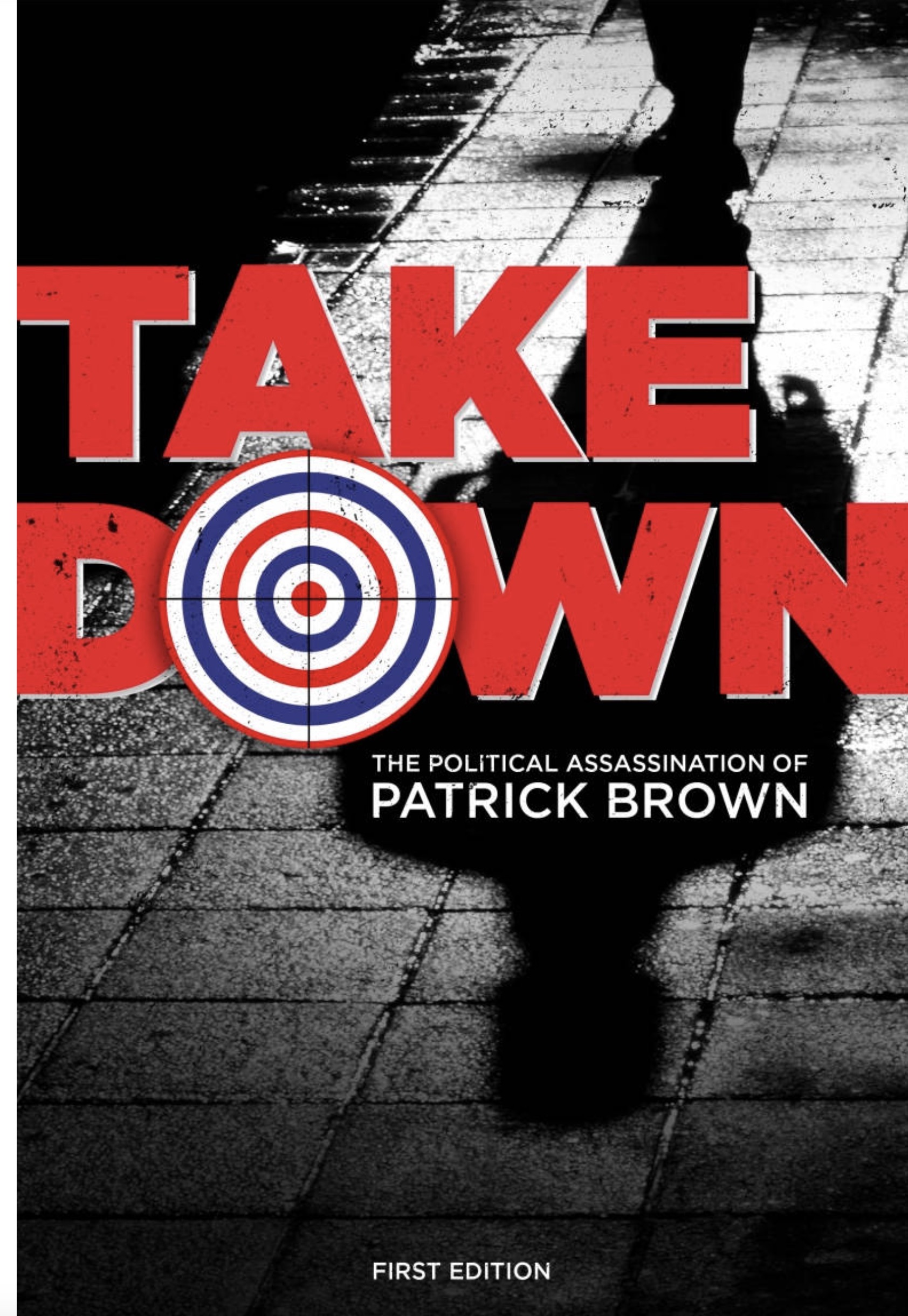
This promise is entirely new, plucked out of thin air.
He is making policy on the hoof again!
The cut in gas tax did not feature in Patrick Brown’s “People’s Guarantee”.
Political Assassination
And speaking of Patrick Brown, I see that he is planning to publish a book in November about his “political assassination”. I don’t know if it is fact or fiction. Probably a little bit of both.
I had largely forgotten about Brown but the prospect of his new revelatory book has rekindled my interest.
At first glance, there doesn’t seem to be a chapter on his tangled and very irregular finances. The Globe and Mail reminds us:
“Since leaving his post, Mr Brown was found to have broken Ontario’s ethics rules by failing to disclose a $375,000 loan from a close friend who later went on to become a Tory candidate. New nomination races were also held in a handful of ridings amid controversies about ballot-stuffing and fake memberships.”
(Of course, it is worth remembering that the PC parachutist, Christine Elliott, is only here in Newmarket-Aurora because her predecessor, Charity McGrath, was caught stuffing the ballot box with fake memberships.)
The Integrity Commissioner, the Honourable J. David Wake, found that Patrick Brown twice breached the Members’ Integrity Act 1994 in failing to disclose rental income from his personal residence in 2016 and 2017 and in failing to disclose a loan from Mr Jass Johal in the same two years. Johal went on to become the PC candidate for Brampton North. You can read the Integrity Commissioner's full report here.
Brown deliberately concealed the truth
The Integrity Commissioner says of Brown's deception:
“The seriousness of the breach was aggravated by the fact that it occurred in both the 2016 and 2017 statements and was not corrected at either of his personal meetings with me when his statements were reviewed. On all the evidence it is clear to me that the non-disclosure was deliberate and not through inadvertence.” (My underlining for emphasis.)
Jass Johal, who loaned $375,000 to Brown, was his adviser, dishing out business cards with the title “Advisor to PC Leader” with the logo and address of the PC Party. Johal went on to become the PC candidate for Brampton North in November 2016 after selling PC memberships on an industrial scale – 6,200. He was disqualified as PC candidate on 15 March 2018. (Seems to me that selling memberships in this way inevitably leads to cronyism and clientism.)
Secret Loan = a berth at Queen’s Park
The Commissioner says the arrangements made by Brown to get his down payment were “Byzantine in nature and disturbing on many levels”. The Commissioner writes:
“Mr. Brown explained that at the time that he received the Loan from Mr. Johal, he was unaware that Mr. Johal was interested in the nomination. He claims that he first learned that Mr. Johal was interested in being a candidate in Fall 2016.
Mr. Johal’s evidence on this point differed from Mr. Brown’s. He indicated that he became interested in running when Mr. Brown became Leader of the PC Party in 2015. He also stated that he did mention to Mr. Brown in 2015 that he was interested in running. “ 
Does Brown seriously expect us to believe he was unaware of the fact that his own official adviser, Jass Johal – the man who secretly loaned him $375,000 – wanted to become a candidate for the Progressive Conservatives? Does Brown take us all for fools?
In late February Caroline Mulroney was urging Patrick Brown “to do the right thing” and drop out of the leadership race. He resigned as Leader then promptly threw his hat into the ring again. She said the PC Party was in “crisis”.
In a funny kind of way it still is.
This email address is being protected from spambots. You need JavaScript enabled to view it.
- Details
- Written by Gordon Prentice
Should political parties be expected to put before the voters a fully costed program for Government, showing what they’ll spend and how they are going to raise the money to pay for it all? 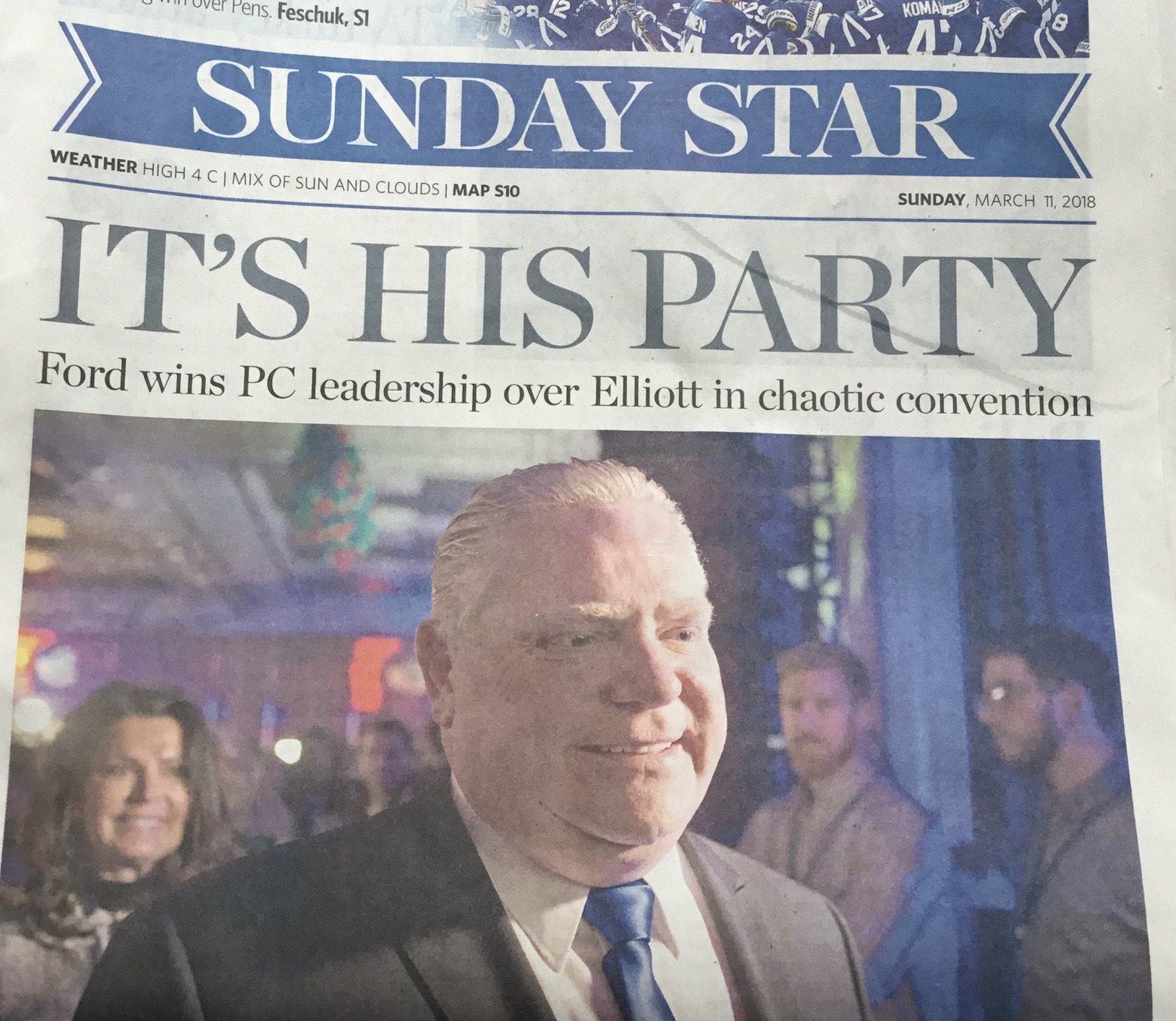
This morning, the Liberals and NDP are trading blows about alleged “major mistakes” in the NDP’s campaign platform. But at least they both have one.
We are now into the second week of the campaign and Ford’s Progressive Conservatives have yet to publish their costed program.
The CBC reminds me that Doug Ford went into the provincial election campaign promising a "solid platform that is fully costed."
I tend to agree with University of Waterloo economics professor Jean-Paul Lam who says:
"I don't think you will see a fully costed platform because I don't think they know where the money is going to come from."
Promising the earth and delivering dust
Ford at various times has told us he is going to cut taxes by 20% for the middle class; cut corporate taxes; cut hydro rates and eliminate provincial taxes for anyone earning less than $30,000 a year. He has mused aloud about scrapping the foreign buyers tax on real estate and cutting provincial taxes in their entirety for doctors practising in the north. He has set his face against a carbon tax, losing the $4 billion in tax revenue that Patrick Brown had factored into his “People’s Guarantee”. He is going to find $5 billion for new subways and transportation initiatives. He is not going to cut public service jobs and he is going to pay for his program through efficiencies such as joint purchasing that will deliver 4 cents in savings for every dollar. He is going to bring down the Provincial debt and balance the books. He pledges to increase spending by $13+ billion while cutting taxes.
No. I don’t believe it either.
We cannot take Ford on trust any more than we should believe Trump when he says (or used to say) that he will publish his tax returns. It is simply not going to happen.
In the absence of a costed program, PC policy commitments are what Ford, speaking ex cathedra, says they are.
When he took over from Patrick Brown, Ford declared the People’s Guarantee dead. Then he said he would change about 10% of the policy platform. Then he just starts making it all up as he goes along.
Ford has piled up so many billion-dollar spending commitments on the fly, coupling them with tax cuts, that it would now be impossible to craft a program that adds up.
Does it matter?
The Ontario Chamber of Commerce evidently thinks so.
evidence-based policy making
Newmarket-Aurora is one of ten ridings to watch. In advance of tomorrow’s “candidates’ discussion luncheon” hosted by the Aurora Chamber of Commerce, I have been reading “Vote Prosperity” – their 2018 election platform which calls for
“evidence-based policy making”.
That sounds OK to me.
But when are we going to see Doug Ford’s PCs deliver on his promise to publish
“a solid platform that is fully costed?”
Does the Aurora Chamber of Commerce have a view on that?
And, if not, why not?
This email address is being protected from spambots. You need JavaScript enabled to view it.
- Details
- Written by Gordon Prentice
I write to the Newmarket Mayoral hopeful Joe Wamback asking for a copy of his election platform. 
Not yet, he says, because there isn’t one. It is, I suppose, work-in-progress. But he suggests we meet for a coffee so he can explain why he is running and set out his “vision and motivation”.
I turn up at the coffee shop and Joe introduces his wife Lozanne who tells me she is a holistic nutritionist. He buys the coffee.
I am keen to know more about the man who wants to be Mayor. In all my years following the twists and turns of municipal politics in Newmarket I had never come across him.
Does any serving councillor support him? No he says. He knows Tom Vegh but hasn’t asked him.
I ask Joe if he has been to a Council meeting this term. No.
If he has written to the local paper about any issue. No.
If he signed the Clock Tower petition, for or against. No.
Unfair questions?
Perhaps.
(At the time, Joe was sitting as a part-time Social Security Adjudicator, no doubt expected to be aloof and above the fray.)
Is Mayor an entry level job?
I ask him if the Mayor is an entry level job. Why not run for Ward Councillor first? Not interested.
He says he can chair meetings and deal with senior staff. And he is going to spend the next six months talking to people, harvesting their ideas.
It is certainly an unconventional approach to politics but perhaps one that chimes with the times.
Joe is not a bit embarrassed by this. He clearly believes in his own abilities.
He asks me what are the most important issues facing the Town. Hold on, I say. I am not the one running for Mayor.
As I am listening to him I am thinking he needs more than a blank sheet of paper and an interesting CV to run for Mayor.
I ask him what he thinks about Doug Ford and get a long answer about Rob. He corrects himself. He knew Rob.
Are you a Doug Ford man?
Now I bite the bullet.
Would it be fair to describe you as a “Doug Ford man”?
Joe hesitates and scrunches up his face a bit. Hmmmm. He says he admires Doug’s family values. And he likes the way he stood by his brother Rob and looked after him. That’s the answer I'm gonna get.
Joe says his campaign proper is going to get going after the Provincial election on 7 June. If the polls are to be believed (and I don’t) Joe could be glad-handing Premier Ford and inviting him to Newmarket. Who knows?
Victims of Crime
Joe has a profile deriving from the work he has done over many years to support the victims of crime. He set up the Canadian Crime Victim Foundation. 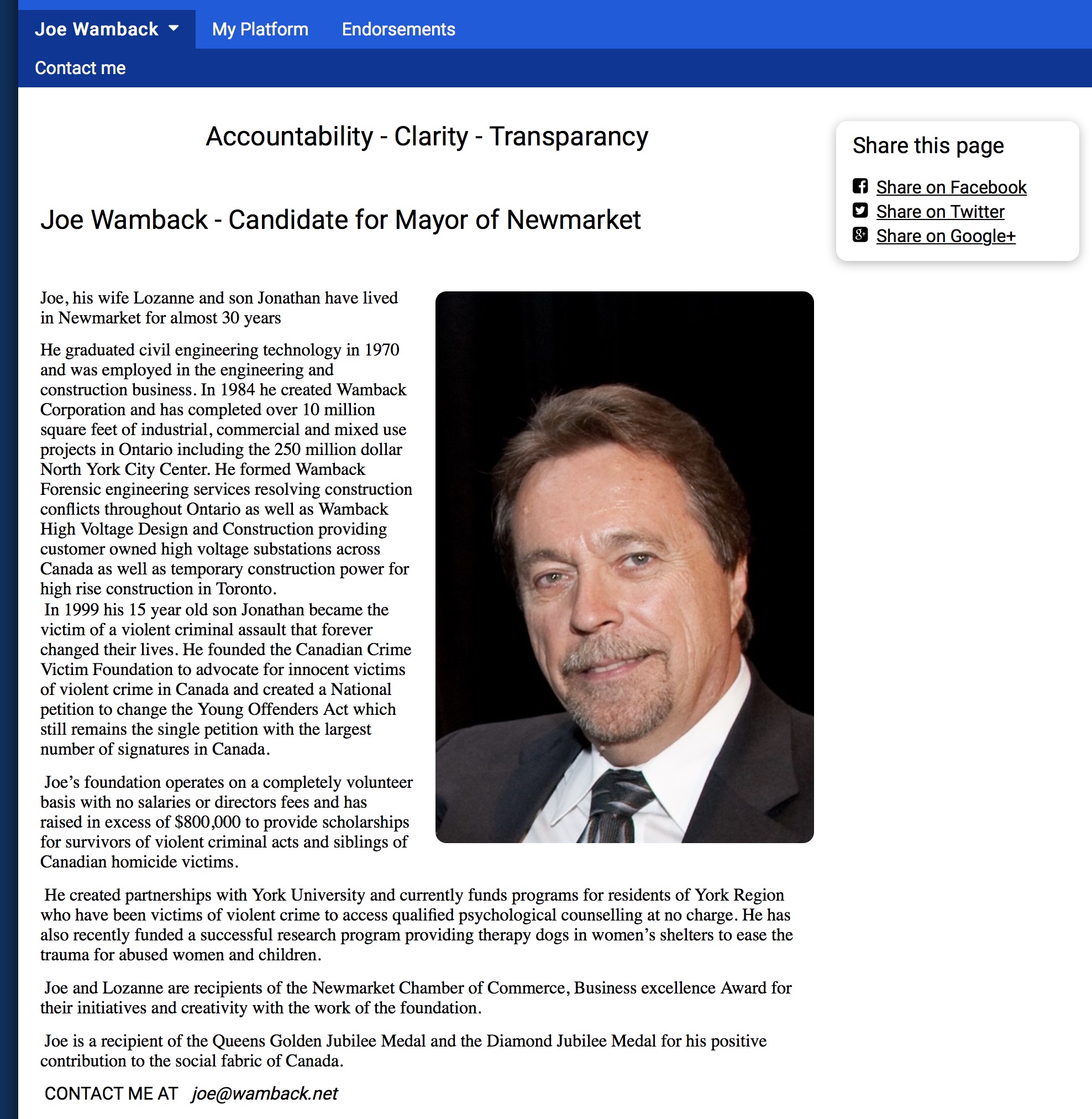
His son Jonathan was badly beaten up by a gang of young people back in 1999 and this had a devastating effect on the family, changing at a stroke the course of their lives.
As a result of his work he tells me he’s gotten to know three Prime Ministers and countless MPs and MPPs. He says he can walk into their offices and get a handshake. I don’t doubt it. He tells me he has, in effect, written legislation. He has appeared before Commons Committees. He has fought the good fight in a cause most people would consider admirable. The victims of crime too often go unheard.
He was awarded the Queens Golden Jubilee Medal in 2002 for his volunteer service.
Joe tells me about his life in business. He describes himself as an engineer and a developer with his own company. And he is an arbitrator. He says he doesn’t shy away from confrontation but assures me it is not his preferred way of doing things.
In 2012 he was appointed by the Harper Government as an adjudicator on the Social Security Tribunal which he says he enjoyed immensely. It is an administrative tribunal with quasi-judicial powers dealing with matters such as Employment Insurance (EI), the Canada Pension Plan (CPP) and Old Age Security (OAS).
His phone, sitting on the table between us, has been glowing for a while. Are you recording this conversation? No, he says. Neither am I.
I ask if he has ever run for elective office before. Once, as a PC in the Federal Election of 2000 in York North – an historic riding which, with boundary changes, has now disappeared. He came third with just under 25% of the vote. He says it happened too soon after the assault on his son.
Joe’s policy platform - Hmmmm
Now I want to get down to some specifics. If elected in October what would be the biggest file on his desk. The one grabbing his immediate attention. Hmmmm.
We talk about affordable housing. He says all the right things. But how do you deliver it? If developers don’t want to develop what do you do? Hmmm.
We touch on transit and he mentions GO Rail. I impertinently ask if he has ever travelled on a bus. Lozanne appears shocked by the question. Of course! she says.
I tell her I meet quite a few people who proudly boast they’ve never been on a bus in Newmarket. Hence the question.
Now we turn to the controversial purchase of Mulock Farm but Joe is sitting on the fence. He says he needs more information. I counter and ask him what he needs that is not already out there? Hmmmm.
We are now talking about Town Hall secrecy and how he would open things up. He volunteers this as a big issue. I play the devil’s advocate and tell him councillors need private space to consider things. The real issue is when do confidential discussions become “declassified” and put into the public domain. In Newmarket, if the issue embarrasses the Town, the papers will remain locked up forever – or, says the Town, until they no longer “have an impact”.
Not running for the money
I am now thanking Joe for being so open with me. I tell him he will be reading my impressions of him in 500 words. Just my scribbles. As I am getting up to leave Joe tells me he is not doing it for the money.
I believe him.
But why is he doing it?
I wish I could say he is running for a reason. But I can’t. There are no specifics. No concrete pledges.
The best I can come up with is that Joe Wamback is running on his conservative values. No more. No less. You vote for Joe because you like the kind of person he is and what he represents.
If you are planning to vote for Doug Ford in June I suspect there is no reason why you shouldn’t vote for Joe Wamback in October.
This email address is being protected from spambots. You need JavaScript enabled to view it.
Update on 15 May 2018: Joe Wamback has launched his campaign website: "Accountability, Clarity, Transparancy" (sic)
- Details
- Written by Gordon Prentice
Yesterday I wander into Christine Elliott’s HQ in the Nature’s Emporium Plaza and ask when the candidates’ debate will be.
I am told it’s coming up in the morning of 24 May 2018 at the Cardinal Golf Club – outside the riding!
Surely some mistake?
It turns out there are two events that bring all the candidates from the three main parties together: the first organised by the Aurora Chamber of Commerce on 16 May and the second, organised by the Newmarket Chamber of Commerce and focussed on business competitiveness, on 24 May.
But so far there isn’t a debate in the riding that’s free and covers the entire sweep of Provincial responsibilities. This is shameful.
If I want to hear the candidates talk about the Ontario Chamber of Commerce platform “Vote Prosperity” I have to first register with the Chambers and fork out $40 for the Aurora event or $35 for the Newmarket breakfast at the Cardinal Golf Club.
Whoaaa! Not good enough.
Surely, someone somewhere is planning to organise a debate that the great unwashed can go along to for free?
What about the Era Newspaper taking the initiative? Or the Auroran?
Chris Ballard tells me:
I am not aware of a public debate. Would love to have one.
I am sure he is speaking for all the candidates. So let's have our local newspapers organise one.
The much-anticipated Party leaders debate – the first of three - is on CTV this evening starting at 6pm.
This email address is being protected from spambots. You need JavaScript enabled to view it.
- Details
- Written by Gordon Prentice
The agreement on the Clock Tower, struck between the Town of Newmarket and the developer Bob Forrest and announced at the close of play on Friday afternoon, should be welcomed.
It ends the long debilitating uncertainty over this key block of buildings in the old downtown and it tentatively sets out a mechanism and a timetable to bring the heritage properties back into use. There will be no new building on the Forrest lands (other than, possibly, some above ground garage structures immediately behind 184-194 Main Street South) although the Town implicitly acknowledges that in the future there may be redevelopment of the 1956 extension to the Clock Tower, the old telephone exchange.
Importantly, as soon as the deal is signed off, the Forrest lands immediately fold back into the Heritage Conservation District with all the protection that designation affords.
This wouldn’t have happened without a strong and vocal coalition of interests coming together and sticking with the issue over the years.
The resolute position taken by the Town’s Heritage Advisory Committee was pivotal. The Business Improvement Area Committee steadfastly opposed the Forrest proposals from the word go. The Heart of Newmarket Citizens’ Group provided invaluable expertise and strategic thinking. The local branch of the Architectural Conservancy of Ontario spread the message that old buildings with a story to tell are worth saving. And countless individuals made it clear they were not prepared to accept what the Mayor said was good for them.
Astonishingly, Van Trappist now brazenly describes the settlement as a win-win despite it being the polar opposite of what he and his enablers in the senior ranks of the Town’s staff have been working on for years.
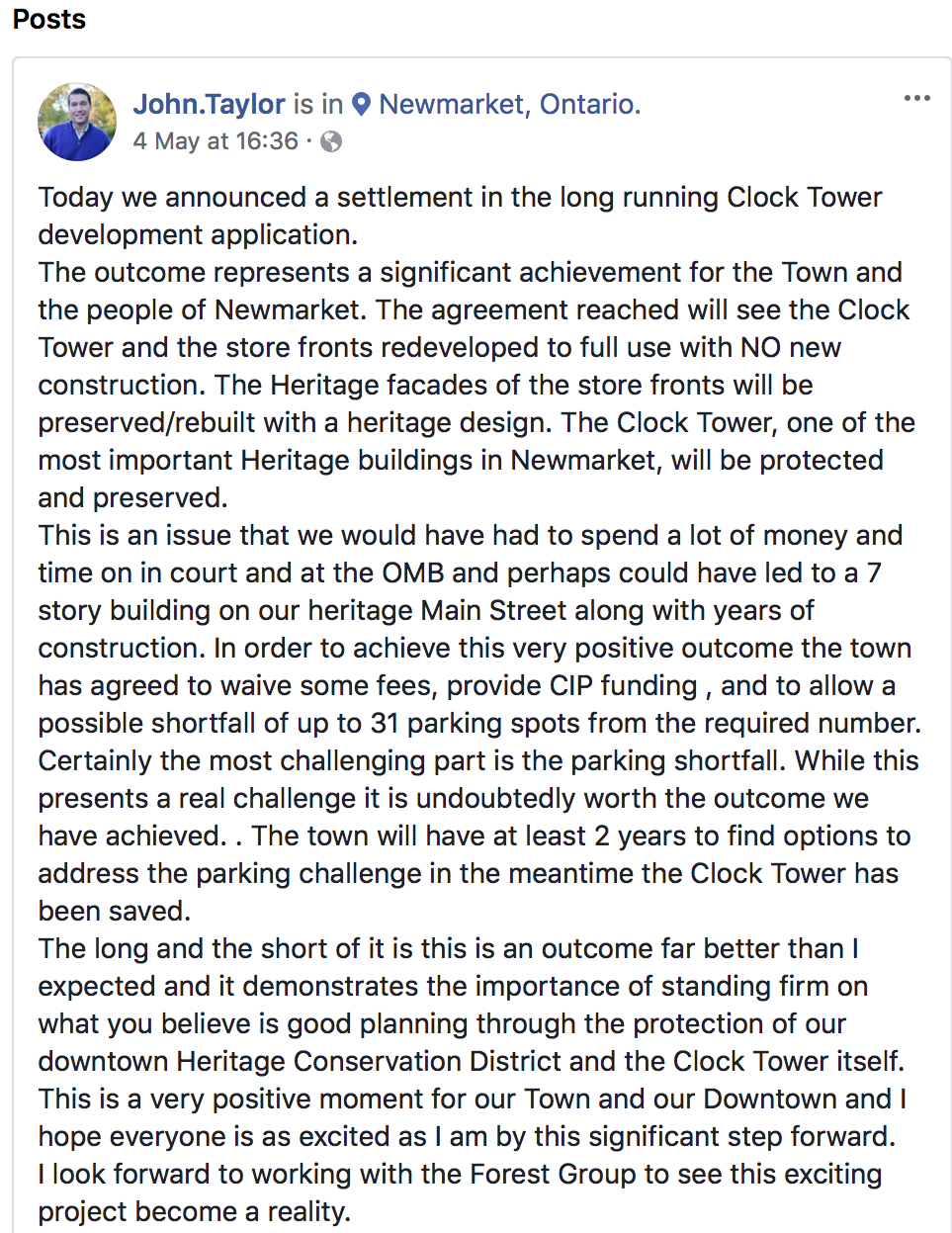
Van Trappist, now the mouthpiece for others, says:
“We are excited that we have reached a solution that is a win-win for the Town, the developer, the downtown area and Newmarket as a whole.”
What’s in it for the Town?
First and foremost, the return of a vibrant and healthy Main Street. For years Forrest’s boarded-up and crumbling properties have blighted the heart of the old downtown.
The Town wants an early end to the dereliction. The restoration work and any construction is to begin as soon as possible but no later than 15 December 2019. If Forrest converts the upper levels of the Main Street buildings to office use the Town will allow him “to demolish the single storey additions at the rear of the Main Street buildings” to create parking spaces.
The settlement immediately placates a very large number of people who have been outraged by the way in which the Town handled the Clock Tower application. The willingness of senior staff to present false information to councillors and the public about the Floor Space Index was unconscionable. The report on 28 November 2016 was going up to Committee for decision.
At some point the endless stonewalling by senior Town staff of legitimate requests for information must stop. We still don’t have details of the so-called “agreement in principle” between the Town and Forrest in June 2013. There is absolutely no reason why that cannot now be released into the public domain.
The latest agreement avoids expensive litigation at the Superior Court on the Market Square land ownership issue which would expose the full extent of the Town’s incompetence in not closing the deal it had with Michael Bryan back in 2003.
It saves the embarrassment of an OMB Hearing in the immediate run-up to the Municipal elections where all manner of hidden skeletons might have been uncovered.
It allows the fraught relationship with the downtown business community to be re-set. Mayoral hopeful John Taylor still envisages some kind of relaxation to the development rules within the Heritage Conservation District but this is for the future and, importantly, he says there will be public consultation. No more development by fiat.
What’s in it for Bob Forrest?
Forrest is still spitting feathers. He believes he was led up the garden path by the Town and that he had an agreement in principle for his proposed development dating from June 2013 that the Town welched on. The eight-page letter he left with councillors when they turned down his proposal on 28 November 2016 was dripping with venom and resentment.
The Town, ever forgiving, will make up to $100,000 available to Forrest for the restoration of the old heritage properties “to the extent that the “New Development Concept” qualifies and meets program criteria.”
If the Clock Tower is developed for residential uses the Town will sell him land-locked land in Market Square (currently housing electrical gear) for $10, the option to be exercised within 5 years.
Forrest’s wife, Coleen, told the press on Friday that getting a sewage link-up to the proposed Clock Tower development before 2026/7 prompted a rethink:
“Despite the expectation of success at the scheduled OMB hearing, the planned Clock Tower condominium building would be unlikely to receive servicing allocation until 2026-27… In the face of unparalleled enthusiasm on the part of over 200 prospective condo buyers, Main Street Clock Inc. has been forced to revisit its business plan for the Clock Tower and Main Street properties.”
“We look forward to sharing in the near future an exciting new concept for this beautiful heritage space — a concept which will bring economic stimulus to downtown Newmarket.”
That is elegant face-saving. In reality, the Forrests – who stood to make $10m clear profit from the earlier development proposal – are furious.
Forrest told his business tenants on 5 January 2016 before he evicted them:
“I don’t want to sound at all arbitrary but it is very real for me. My business isn’t renting stores. My business is building buildings and I want to get to the point that I can build my building at the earliest possible moment.”
What’s in it for the downtown area and for Newmarket as a whole?
Old Main Streets across Ontario are under assault by developers as never before. Municipalities, frightened of their own shadows, routinely capitulate, fearing the costs of going to the OMB. Those Main Streets that survive largely intact – such as Newmarket’s – will increasingly have a rarity value which the Town, its businesses and the wider community can cash-in on.
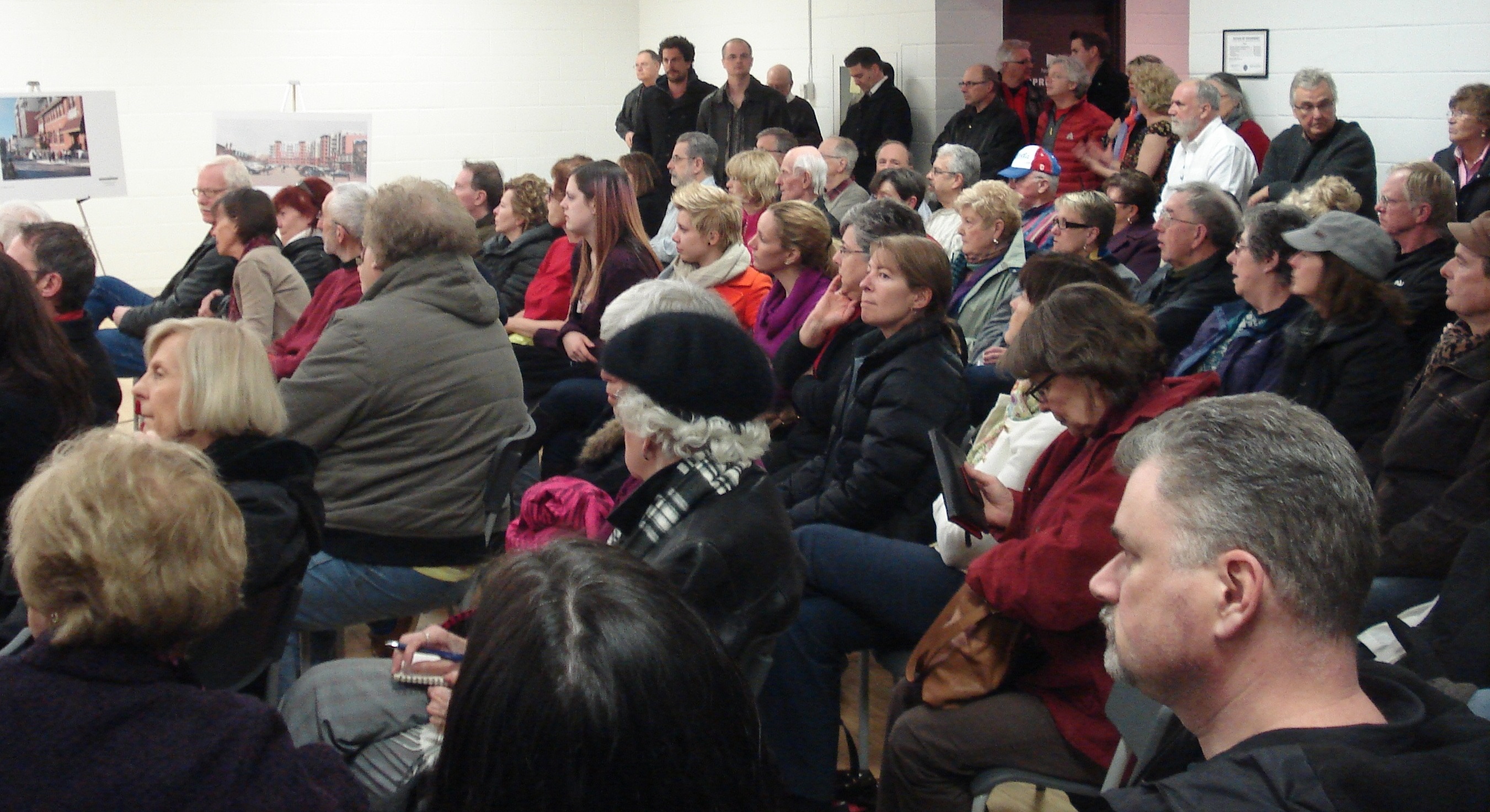
Maybe the former business tenants, unfairly evicted by Bob Forrest, will have the opportunity to return to the heritage buildings they once occupied. I hope so.
Parking remains an issue. As I see it, there is probably no long-term “solution” for parking in the heritage downtown, just a series of short-term fixes. John Taylor says the terms of the settlement leave the Town with a possible parking shortfall of up to 31 spaces but:
“the Town will have at least two years to find options to address the parking challenge in the meantime the Clock Tower has been saved.”
In one form or another, the Clock Tower saga has been running since 2011. That’s way too long for members of the public to stay engaged. People have their lives to lead.
But, that said, unless we stick with it over the long term – and that is quite the challenge - the developers win. They have the time and the money.
Forrest says quite candidly they make things happen and get results:
“by leveraging our strong reputation and existing relationships with municipal staff and politicians.”
And to get his development going Forrest was, of course, prepared to allow demolition by neglect. In May 2016, Forrest said of the historic commercial properties he owns:
“The roofs leak. The roofs and the floors sag.”
Now he will have to fix them.
This email address is being protected from spambots. You need JavaScript enabled to view it.
Page 154 of 287
